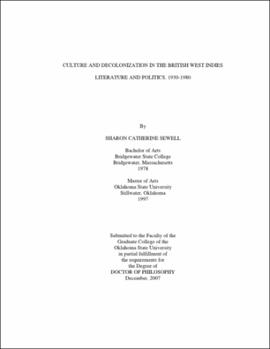| dc.contributor.advisor | Williams, Elizabeth | |
| dc.contributor.author | Sewell, Sharon Catherine | |
| dc.date.accessioned | 2013-11-26T08:24:18Z | |
| dc.date.available | 2013-11-26T08:24:18Z | |
| dc.date.issued | 2007-12 | |
| dc.identifier.uri | https://hdl.handle.net/11244/6787 | |
| dc.description.abstract | Scope and Method of Study: The purpose of this study was threefold: first, to investigate the use of the label West Indian to describe the former colonial subjects of the British in the Caribbean after World War II; second, to determine whether West Indian novelists, who began writing in 1949, had an impact in shaping the culture of the West Indies before and after independence; and third, to examine whether the novels they wrote used social realism to describe West Indian society between 1950 and 1980 and thus can be used to supplement the historical portrait of the islands. The method used included a historical and literary examination of the political, economic, social, and cultural developments on the islands. | |
| dc.description.abstract | Findings and Conclusions: The study determined that British colonial subjects from the islands of the West Indies adopted the term to describe themselves when they began to interact after World War II particularly among islanders who traveled to Britain and found that no matter which island they came from, they shared certain characteristics, which drew them together in what was often a hostile environment in Britain. The study also found that West Indian novelists had an impact in shaping the culture of the region. Although only the elites on the islands read their novels, as Benedict Anderson has argued, elites were important in shaping identity and creating a sense of community. Many novelists also contributed to local culture as members of or consultants to the new governments that emerged on the islands after independence. Most importantly, the study found that these novels presented a realistic view of West Indian society between 1950 and 1980 that can be used to supplement the historical record of the period. The novelists described life as they knew it; they wrote from the perspective of the masses. | |
| dc.format | application/pdf | |
| dc.language | en_US | |
| dc.rights | Copyright is held by the author who has granted the Oklahoma State University Library the non-exclusive right to share this material in its institutional repository. Contact Digital Library Services at lib-dls@okstate.edu or 405-744-9161 for the permission policy on the use, reproduction or distribution of this material. | |
| dc.title | Culture and decolonization in the British West Indies: Literature and politics, 1930-1980 | |
| dc.contributor.committeeMember | Byrnes, Joseph | |
| dc.contributor.committeeMember | Petrin, Ronald | |
| dc.contributor.committeeMember | Brown, Donald | |
| osu.filename | Sewell_okstate_0664D_2513.pdf | |
| osu.accesstype | Open Access | |
| dc.type.genre | Dissertation | |
| dc.type.material | Text | |
| dc.subject.keywords | british west indies | |
| dc.subject.keywords | west indies literature | |
| dc.subject.keywords | jamaica | |
| dc.subject.keywords | trinidad | |
| dc.subject.keywords | barbados | |
| thesis.degree.discipline | History | |
| thesis.degree.grantor | Oklahoma State University | |
